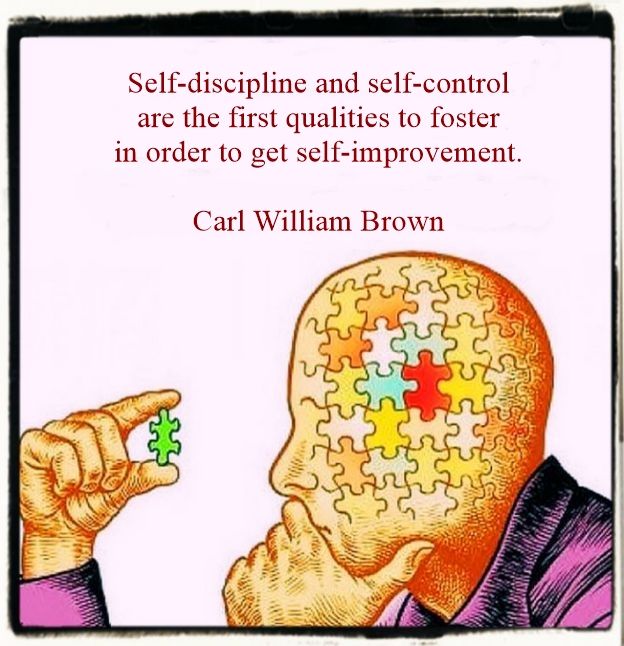
How to improve self-discipline, some very useful ways to enhance it, with quotes, tips and tricks to start increasing your self-control and your success in life
Self-discipline is the ability to make yourself do what you should do, when you should do it, whether you feel like it or not.
Elbert Hubbard
I can’t always control my thoughts but I can choose how I respond to them.
David Cuschieri
With self-discipline most anything is possible.
Theodore Roosevelt
You can never conquer the mountain. You can only conquer yourself.
Jim Whittaker
We are what we repeatedly do. Excellence then is not an act, but a habit.
Aristotle
Talking about education and values first of all we have always to keep in mind words such as responsibility, self-discipline, respect, sharing and caring, perseverance, honesty, friendship, cooperation and we might go on, but today we are going to analyse “self-discipline”.
Self-discipline is self-control and self-restraint. Self-discipline is self-reliance and independence. Everyone can exercise self-discipline. You must complete your assignments, stay on task, wait to be called on, work toward personal and community goals, try again and again, ignore peer pressure, choose productive rather than destructive activities, control your temper and so on.
In order to strengthen your self-discipline you must practice a lot. First of all decide that you really want to be someone who’s self-disciplined. Your desire will motivate you to make good choices. Make a personal commitment to develop and strengthen these traits. Write down specific things to do. Learn the rules that determine what you can and cannot do. Be accountable. Accept responsibility for your own behavior. Don’t blame others for your actions and decisions.

Practice. Self-discipline is something you can teach yourself. For example, set aside time to read more or to clean up. Do activities that enhance your self-discipline like yoga, walking, rock-climbing, practicing a musical instrument. Eliminate harmful habits. For example, if you spend several hours each week watching violent videos or Tv programs, make a conscious decision to spend your time in healthier, more productive ways. Start a self-discipline group to plan and carry out activities.
Students who exercise self-discipline:
Complete their assignments; Stay on task; Wait to be called on; Work toward personal and community goals; Try again and again; Ignore peer pressure; Choose productive rather than destructive activities; Control their tempers; Eight ways to strengthen your self-discipline.
Decide that you really want to be someone who’s self-disciplined. Your desire will motivate you to make good choices.
Make a personal commitment to develop and strengthen these traits. Write down specific things to do.
Learn the rules that determine what you can and cannot do.
Be accountable. Accept responsibility for your own behavior. Don’t blame others for your actions and decisions.
Practice. Self-discipline is something you can teach yourself. For example, set aside time to read more or to clean up.
Do activities that enhance your self-discipline like yoga, walking, rock-climbing, practicing a musical instrument.
Eliminate harmful habits. For example, if you spend several hours each week watching violent videos or Tv programs, make a conscious decision to spend your time in healthier, more productive ways.
Start a self-discipline group to plan and carry out activities.

Some Useful Activities
If we were supposed to talk more than we listen, we would have two mouths and one ear.
Mark Twain
He that cannot obey, cannot command.
Benjamin Franklin
If Self-Discipline Feels Difficult, Then You’re Doing It Wrong.
Mark Manson
Brainstorm a list of problems that might result from a lack of self-discipline: personal appearance, physical-mental-emotional health, school success, life success, friendships, job performance, talents, participation in family-clubs-community-faith, marriage, parenting.
Do silly exercises to strengthen your self-discipline like not scratching.
Role-play how you might talk with a younger brother or sister who is demonstrating a lack of self-discipline.
Write or tell a chain story about a make-believe prince or princess who has no self-discipline.
Interview scientists, engineers, doctors, and other people to learn the role of self-discipline in training for their careers and in working.
Investigate different animal species to learn if they use discipline. Is misbehavior punished in young or in a group situation?
Examine nature to find examples of discipline and order such as patterns.
Explore tessellations (repeating geometric patterns).
Research discipline in history.
Draw cartoons showing examples of self-discipline vs. no discipline.
Write new lyrics to a popular song that encourage self-discipline, self-restraint, and self-reliance.
Explore musical dynamics and control.
Learn about self-discipline in sports.
Play a “stop-wait-go” game thinking of different situations.
A great way to develop self-discipline is to make it a habit to do the things you should be doing when you feel the laziest. Every time you feel really lazy, do the opposite of what you feel like doing.
Anonymous
Discipline not desire determines your destiny.
Anonymous

Now let’s consider 6 ways to improve your Self-Discipline from an article by Amy Morin.
You hear people say things like, “I don’t have the willpower to do that,” as they watch their friend order the salad instead of the fried chicken. It’s as if they believe that some people were simply born with divine willpower while others were overlooked as self-discipline superpowers were being handed out. The truth is, self-discipline is a learned skill, not an innate characteristic.
It’s clear that many people don’t know how to increase their self-discipline, however. In the 2011 Stress in America Survey (link is external), 27 percent of respondents said the lack of willpower was the biggest barrier to making healthy lifestyle changes. Many of the respondents agreed that they could likely increase their willpower, but the vast majority felt like the key to improved willpower was having more time to themselves. What many of the respondents may not have recognized is that increased leisure time doesn’t automatically equate to increased self-discipline.
Instead, the only way to improve your self-discipline is through intentional and dedicated practice. As with all types of self-improvement, change is difficult and it takes time.
Here are six strategies to increase your self-discipline:
1. Acknowledge Your Weaknesses – Whether cookies are the downfall to your diet, or you can’t resist checking your social media accounts every two minutes, acknowledge your pitfalls. Too often people either try to pretend their weaknesses don’t exist or they try to minimize the negative impact their bad habits have on their lives. For example, many smokers think, “I could quit if I wanted to,” because they don’t want to admit they’re hooked.
2. Establish a Clear Plan – No one wakes up one day suddenly blessed with self-discipline. Instead, you need a strategy. Whether you want to increase good habits like exercising more often, or you want to eliminate bad habits like watching too much TV, develop a plan that outlines the action steps you’re going to take to reach your goals.
3. Remove the Temptations When Necessary – Although we’d all like to believe we have enough willpower to resist even the most alluring enticement, it only takes one moment of weakness to convince ourselves to cave to temptation. Making it difficult to access those temptations can be pivotal to increasing self-discipline. If your weakness is Facebook, turn off the internet while you’re working. If you can’t resist overspending when you go to the mall, leave the credit card at home and only take a small amount of cash.

4. Practice Tolerating Emotional Discomfort – It’s normal to want to avoid pain and discomfort, but trying to eliminate all discomfort will only reinforce to yourself that you can’t handle distress. We can usually stand a lot more discomfort than we think we can. Practice allowing yourself to experience uncomfortable emotions like boredom, frustration, sadness, or loneliness and increase your tolerance to the negative emotions that you may experience as you increase your self-discipline.
5. Visualize the Long-Term Rewards – You’ll be less likely to cave to temptation when you focus on the long-term gain. Giving in to today’s temptations may make you feel happy now, but long-term happiness and contentment requires you to forgo immediate gratification. Visualize yourself meeting your goals and reaping the rewards that you’ll gain by practicing self-discipline on a daily basis.
6. Recover From Mistakes Effectively – Self-discipline comes easier on some days than others. If you’re feeling stressed about an upcoming presentation, you may convince yourself to skip your workout. Or if you’re ecstatic about your most recent business deal, you may let your good habits slide for a bit. Making mistakes is part of the process to becoming better. The way you recover from those mistakes is what’s most important. The key is to acknowledge your mistakes and move on from them with even more resolve to do better next time.
If you want to know more about self-discipline and self-improvement you can also read our posts about

